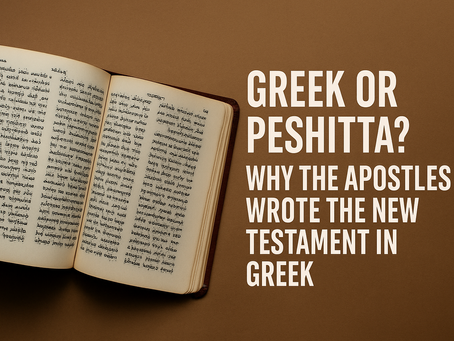top of page


What Language Was the Bible Originally Written In?
What Language Was the Bible Originally Written In? One of the most common misconceptions about the Bible is that it was originally written in Latin. Others assume it was all Hebrew, while some argue for Aramaic or even claim the New Testament was first written in Hebrew or Syriac (the Peshitta). The truth is more complex—but also more secure. The Bible was written over many centuries, by dozens of authors, in a few key languages.
5 min read


The CEB: Accessibility, Collaboration, and Controversy
The CEB: Accessibility, Collaboration, and Controversy. The Common English Bible (CEB) is one of the newest major English translations, first published in 2011. It was created with the goal of making Scripture clear and approachable for everyday readers while still retaining accuracy and faithfulness to the original texts.
4 min read


The KJV: History, Myths, and Meaning
The KJV: History, Myths, and Meaning. The King James Version (KJV) of the Bible, first published in 1611, remains one of the most famous and enduring translations in the history of Christianity. Its phrases shaped the English language, its cadence inspired poets and preachers alike, and its cultural impact has been felt for over four centuries. Yet as loved as it is, the KJV is also surrounded by myths and misconceptions.
9 min read


The Myth of the “Intertestamental Period”
The Myth of the “Intertestamental Period”. Many Protestant Bibles speak of the “Intertestamental Period” or “400 years of silence.” This phrase refers to the time between Malachi (as arranged in the Protestant canon) and the New Testament. The idea is that God gave no prophetic word during those centuries, leaving Israel in silence until John the Baptist arrived.
3 min read


Greek or Peshitta? Why the Apostles Wrote the New Testament in Greek
Greek or Peshitta? Why the Apostles Wrote the New Testament in Greek. Some modern movements—especially Sacred Name groups—claim that the New Testament was not written in Greek, but in Aramaic (specifically the Peshitta). They argue that the Greek text is a corruption, and only the Peshitta preserves the “true” words of Jesus and the Apostles.
4 min read


Sirach (Ecclesiasticus): Wisdom Rooted in Covenant
Sirach (Ecclesiasticus): Wisdom Rooted in Covenant. The Book of Sirach—also called Ecclesiasticus or The Wisdom of Jesus Son of Sirach—is one of the great treasures of the Bible of the Early Church. Written around 200–175 BC, it bridges the Hebrew wisdom tradition with the world of the New Testament. For centuries it was considered Scripture by Jews and Christians alike, though most Protestant Bibles now omit it.
4 min read


The Masoretic Text: What It Is—And What It’s Not
The Masoretic Text: What It Is—And What It’s Not. If you’ve ever read a Bible that didn’t include the so-called “Apocrypha,” or noticed differences in Old Testament quotations between your Bible and the New Testament authors, you’ve likely encountered the effects of the Masoretic Text (MT). But what is it, really? Where did it come from? And why does it matter?
9 min read


The Septuagint (LXX): The Bible of the Early Church
The Septuagint (LXX): The Bible of the Early Church. If you’ve ever seen a tiny “LXX” in the footnotes of your Bible and wondered what it meant, you’ve stumbled onto one of the most important—and misunderstood—parts of biblical history. LXX stands for “Septuagint,” the Greek translation of the Old Testament. It was the Bible used by Jesus, the apostles, and the early church. And yet, many modern Bibles today rely almost entirely on a different text: the Hebrew Maso
5 min read


King James Bible - A Superior Translation?
King James Bible - A Superior Translation? KJV-Onlyism is the belief that the King James Version (1611) is not only a valid translation of the Bible, but the only divinely authorized, inspired, and preserved Word of God in English. For some, it is viewed as perfect, unchangeable, and superior even to the original Hebrew and Greek.
7 min read


Bible History
Many people pick up a Bible without realizing that this book has a history all its own—a long journey stretching thousands of years, across languages, cultures, and even empires. The Bible wasn’t dropped into the world fully formed. Instead, it was carefully written, copied, translated, and gathered into the collection of books we have today.
10 min read


The Apocrypha: Lost Books or Forgotten Scripture?
The Apocrypha: Lost Books or Forgotten Scripture? The word “Apocrypha” means hidden in Greek. But in this context, it refers to a group of ancient Jewish writings included in the Greek Old Testament—the Septuagint (LXX)—but later excluded from the Hebrew Masoretic Text. These books are also known as the Deuterocanonical Books (literally, “second canon”), especially in Catholic and Orthodox circles, where they are considered fully inspired Scripture.
5 min read
bottom of page